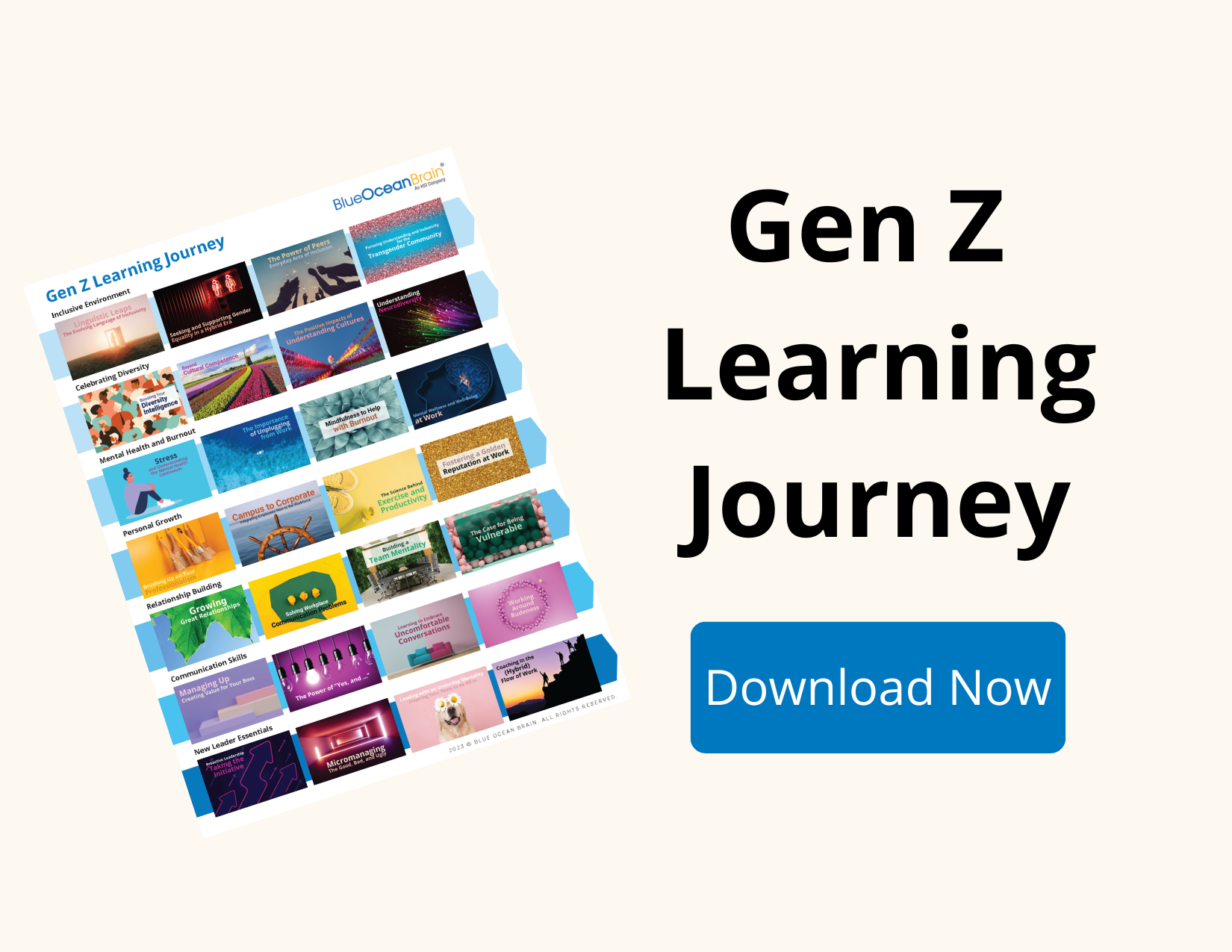Born between 1997 and 2012, Gen Z consists of teenagers and young adults either in college or getting their first taste of working in their chosen field. By 2025, the World Economic Forum estimates that Gen Z will make up about one-third of the global workforce. As is true with each new generation, Gen Z entering the workforce will present some challenges for their more seasoned colleagues. Employers will need to be ready to guide them into the existing culture, while also adapting to the inevitable shifts in attitudes, priorities, and values that happen with every new age group.
Understanding Gen Z in the workforce
Gen Z’s worldview was largely shaped by the Covid-19 pandemic and the turbulent social, political, and economic times that surrounded it. In many ways, this instilled resilience and adaptability, but it also kept them from experiencing the world—and the workplace—in the same way prior generations did.
A strong sense of personal beliefs and emphasis on diversity, individuality, and mental health distinguishes Gen Z from previous cohorts. They appreciate employers with similar values and will leave a company that doesn’t uphold those values.
At the same time, Gen Z is on track to be the best-educated and most curious generation, as they are more likely to go to college than older colleagues. And growing up at the height of the digital age, they are considered digital natives.
Organizations must understand their Gen Z employees’ goals and characteristics not only to make them welcome but also to tap into their talents. In this way, employers can recognize and nurture the workforce’s future leaders.
How Gen Z differs from prior generations
There isn’t necessarily a drastic difference between Gen Z in the workplace and their counterparts. But some generational nuances are worth employers' attention. By understanding and acknowledging these differences, they can target training and development programs accordingly.
Diversity and inclusion
Gen Z is the most diverse generation ever, with 48% of their population being racial or ethnic minorities and 1 in 6 Gen Z identifying as transgender or queer. There is more support and allyship towards LGBTQ+ members within Gen Z compared to older groups.
As a result, Gen Z strongly advocates for marginalized communities, valuing diversity, equity, and inclusion more than previous generations. A recent poll found 83% of Gen Z consider DEI initiatives a top factor when evaluating potential employers.
A work environment with diversity and inclusiveness at all levels is necessary for Gen Z to feel a sense of belonging and an ability to grow their career internally. Regardless of differing views about DEI initiatives, Gen Z will appreciate companies that build these principles into their corporate culture.
Education and professional development
Gen Z wants to work for companies with professional development initiatives. LinkedIn’s Workplace Learning Report found that 76% of Gen Z learners believe learning is the key to a successful career.
HSI Blue Ocean Brain’s microlearning platform is ideal for a generation that values both professional development and autonomy in their learning experience.
Burnout and work/life balance
Gen Z entering the workforce during the pandemic came with a high level of stress and burnout. A lack of workplace autonomy, financial instability, and the normalization of hustle culture contributed to 46% of Gen Z stating that they feel stressed most or all of the time.
Gen Z needs a consistent work environment after experiencing so much instability during their developmental years. Workplace cultures with constant communication, defined expectations, and inclusive feedback will help support their mental health and combat burnout.
Communication and technology
Although Gen Z has innate technological prowess, their reliance on digital tools often results in a lack of relationship-building and interpersonal communication skills. The limited physical interaction in the workplace due to remote/hybrid work also makes Gen Z come up short in some soft skills such as public speaking and collaboration.
As many companies are bringing employees back to the office, Gen Z may struggle with things that older workers see as a return to normalcy. Employers can help by providing psychological safety as everyone works toward a cohesive culture.
Environmental, Social, and Corporate Governance
Gen Z wants to work for companies that value more than just profit. Initiatives that promote sustainability, ethics, and social responsibility are important to them.
Environmental, Social, and Corporate Governance (ESG) programs can lead to greater employee engagement and satisfaction. Provide opportunities to engage in meaningful projects and social initiatives for Gen Z employees that support themselves, their peers, and the community.
Providing growth opportunities to Gen Z
Gen Z can easily leverage technology to streamline work processes and embrace remote work and digital tools. To maximize these skills and build well-rounded high performers, organizations must provide training that fills in the gaps.
Supporting younger employees with learning tools that cater to their needs and wants as employees will create a wave of emerging talent dedicated to a psychologically safe, innovative, and collaborative work environment.
- Communication Skills
Increased technology use and virtual education during the pandemic meant missed opportunities for Gen Z to develop soft skills. Training on effective communication with coworkers is beneficial and creates an internal network for Gen Z. - Relationship-building
Workplace friendships increase employee engagement and foster a sense of belonging. Training that supports relationship-building skills such as empathy, active listening, and allyship—both in person and virtually—is highly effective as Gen Z understands the importance of weaving DEI into their everyday lives. - Addressing mental health and burnout
High-stress world events and increased media exposure resulted in mental health struggles for Gen Z. They want to work for companies that offer resources to support their mental health and well-being. Companies with an initiative to improve their employee’s well-being and resilience are valued and appreciated. Training on skills such as resilience and mindfulness can help Gen Z navigate their rising levels of burnout and stress. - Leadership development
Gen Z will stay at jobs that offer defined growth and advancement opportunities. As Gen Z works to take on higher roles and responsibilities within their organization, it is essential to provide ongoing training to develop the skills needed to be a great future leader. Investing in employees early on increases retention and provides opportunities for companies to begin their succession planning and fill their talent pipeline. Implementing mentorship programs fosters personal growth and strengthens multigenerational connections in the workplace.
How Gen Z will change the workforce
Gen Z is a generation unlike we have ever seen before. Their unique relationship with technology and adversity makes them an organizational asset. However, many feel unprepared to navigate the workplace and will need ongoing training and support. They are seeking employers who invest in their personal and professional development. Implementing policies that support your younger employees will plant roots of inclusivity and productivity that will grow within your company.
The workforce is constantly evolving. Over time, Gen Z’s characteristics and ideals will blend with those of previous generations, resulting in new norms. It is best to stay flexible as Gen Z enters the workforce, staying open to the positive aspects of fresh ideas rather than rigidly sticking to past methods.
HSI Blue Ocean Brain has the resources to help you implement the training that Gen Z craves. Our award-winning content library provides just-in-time learning on the soft skills that matter most in today’s workplace. To learn more about how we can support your organization's learning goals, click here to schedule a consultation.




![[New eBook] Solving the Talent Crisis with Talent Development](https://blog.blueoceanbrain.com/hs-fs/hubfs/how-to-solve-the-talent-crisis.png?width=760&name=how-to-solve-the-talent-crisis.png)
